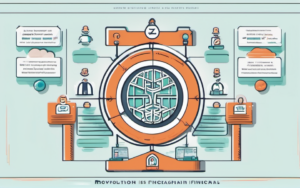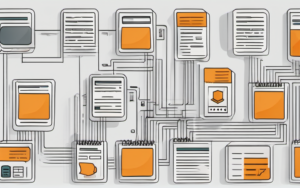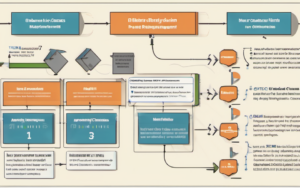The world is on the cusp of a technological revolution driven by Blockchain Technology, a decentralized and immutable ledger that promises to transform various industries and aspects of our lives. With its potential to revolutionize how we interact, transact, and share information, it’s no surprise that blockchain has captured the imaginations of tech enthusiasts and industry leaders alike. But what does the future hold for this groundbreaking technology, and how will it shape the world in the next decade?
The Transformative Power of Blockchain
At its core, blockchain technology offers a unique set of advantages that are poised to disrupt traditional systems and processes. Its key features include:
Decentralization and Trust
Blockchain operates on a decentralized network, eliminating the need for a central authority to control transactions. This fosters trust and transparency, as all participants have equal access to the same information.
Transparency and Traceability
Every transaction on a blockchain is recorded permanently and publicly, ensuring complete transparency and traceability. This feature has profound implications for industries where trust and accountability are paramount.
Security and Immutability
Once a transaction is recorded on a blockchain, it cannot be altered or deleted, making it incredibly secure. This immutability protects against fraud, tampering, and data breaches.
Impact on Industries
The transformative power of blockchain technology is not confined to the realm of speculation and hype. It is already making a tangible impact on various industries, from finance to healthcare.
Finance: Decentralized Finance (DeFi) and Beyond
Blockchain technology has revolutionized the financial landscape, giving rise to decentralized finance (DeFi). This emerging ecosystem offers a range of financial services, such as:
Cryptocurrencies and Digital Assets
Cryptocurrencies like Bitcoin and Ethereum have become mainstream assets, offering alternative investment opportunities and challenging traditional financial systems.
Lending and Borrowing Platforms
Blockchain-based lending platforms enable peer-to-peer lending, removing the need for intermediaries and offering greater transparency and accessibility.
Insurance and Asset Management
Blockchain technology is being used to develop innovative insurance and asset management solutions, offering increased efficiency and transparency in these traditionally complex sectors.
Supply Chain Management: Enhanced Efficiency and Transparency
Blockchain technology can significantly improve supply chain management by providing:
Tracking Goods from Origin to Destination
Every step in the supply chain can be recorded on a blockchain, allowing for real-time tracking of goods and enhancing transparency.
Reducing Counterfeit Products
Blockchain-based systems can authenticate products and track their origins, making it more difficult for counterfeit goods to enter the market.
Improving Supply Chain Visibility
All stakeholders in the supply chain have access to the same information, improving collaboration and reducing delays.
Healthcare: Secure and Efficient Data Management
Blockchain technology can revolutionize healthcare by addressing key challenges related to data security and privacy:
Electronic Health Records (EHRs)
Blockchain can enable secure and tamper-proof storage of electronic health records, improving patient privacy and data integrity.
Drug Traceability and Supply Chain Security
Blockchain can track the movement of drugs from manufacturing to distribution, preventing counterfeiting and ensuring safe medication.
Personalized Medicine and Research
Blockchain can securely store and share patient data for research purposes, facilitating personalized medicine and improving healthcare outcomes.
Government and Public Services: Increased Transparency and Accountability
Blockchain technology can enhance government operations and public services by increasing transparency and accountability:
Voting Systems and Elections
Blockchain-based voting systems can ensure secure and verifiable elections, reducing the risk of fraud and increasing voter confidence.
Land Registry and Property Ownership
Blockchain can streamline land registration processes and provide a secure and transparent system for property ownership.
Identity Management and Digital IDs
Blockchain-based digital identity systems can provide secure and verifiable digital identities, simplifying authentication and reducing fraud.
Challenges and Considerations
While blockchain technology offers tremendous potential, several challenges and considerations must be addressed for its widespread adoption.
Scalability and Performance
Blockchain networks need to scale to handle increasing transaction volumes and accommodate a wider range of applications.
Regulation and Compliance
As blockchain technology matures, clear regulatory frameworks are needed to ensure responsible development and prevent misuse.
Security and Privacy Concerns
While blockchain is inherently secure, vulnerabilities can arise, and robust security measures are needed to protect user data and prevent breaches.
The Future of Blockchain
The future of blockchain technology is bright, with ongoing innovation and development driving its evolution. Key trends to watch include:
Interoperability and Cross-Chain Solutions
Efforts are underway to create interoperable blockchain networks, allowing different blockchains to communicate and exchange information seamlessly.
Artificial Intelligence (AI) and Blockchain Integration
The integration of artificial intelligence with blockchain technology is opening up new possibilities for data analysis, decision-making, and automation.
The Metaverse and Blockchain Applications
Blockchain technology is playing a crucial role in the development of the metaverse, providing secure and decentralized platforms for digital assets, identity, and transactions.
A World Transformed by Blockchain
The future is already here, and it’s powered by blockchain technology. As blockchain continues to evolve, it will undoubtedly play an increasingly prominent role in shaping our world. From revolutionizing finance and healthcare to transforming supply chains and government services, blockchain has the potential to create a more efficient, transparent, and secure future for everyone.




